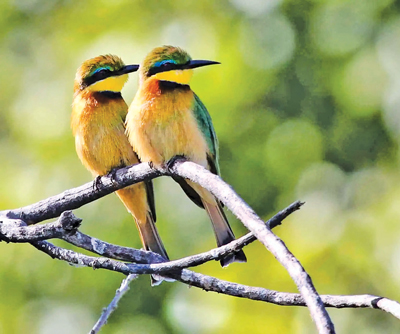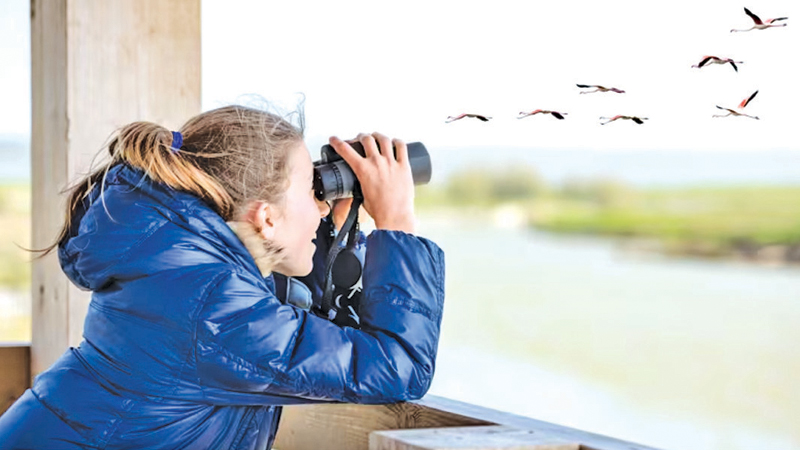Birdwatching is a pastime that offers travellers an enchanting glimpse into nature’s wonderful world. It’s a pursuit that requires little more than patience and a willingness to observe the life happening all around us. Isn’t it a a subtle yet powerful form of nature appreciation that raises important ethical considerations about the value of keeping birds in their natural habitats rather than confining them in cages.
For many seasoned travellers, the thrill of a new destination often extends beyond historical landmarks and bustling marketplaces. It is found in the serene moments spent watching native birds flit from tree to tree, their plumage catching the sunlight in bursts of colour. From the flamingos in Kenya’s Lake Nakuru to the bald eagles soaring over the Alaskan wilderness, birdwatching offers a window into ecosystems unique to every corner of the globe.
But you don’t need to be a world traveler to experience the magic of birdwatching. One of the greatest joys of this activity is its accessibility. Birds are everywhere—be it the city, countryside, or your very own garden. Every morning, as dawn breaks and the world is still waking up, the first sounds you’re likely to hear are the melodies of birds. Whether it’s the chirping of sparrows or the more elaborate calls of blackbirds, these sounds are a reminder that we share our world with creatures who have long adapted to live in harmony with their environments. They are also a reminder of nature’s resilience, even in the face of urban sprawl.
Birdwatching in your garden
 Watching birds in your garden offers an experience of nature’s theatre on a small, intimate scale. If you’ve ever spent an afternoon watching the interaction between a robin and a finch, or observed a woodpecker drilling into a tree, you’ll know that these moments are no less captivating than the grand spectacles of nature that travelers often seek. Here, nature is not some distant spectacle but a living, breathing part of your daily surroundings. Setting up a bird feeder or simply maintaining a garden that invites birds—filled with flowers, shrubs, and a water source—can turn your backyard into a miniature wildlife sanctuary.
Watching birds in your garden offers an experience of nature’s theatre on a small, intimate scale. If you’ve ever spent an afternoon watching the interaction between a robin and a finch, or observed a woodpecker drilling into a tree, you’ll know that these moments are no less captivating than the grand spectacles of nature that travelers often seek. Here, nature is not some distant spectacle but a living, breathing part of your daily surroundings. Setting up a bird feeder or simply maintaining a garden that invites birds—filled with flowers, shrubs, and a water source—can turn your backyard into a miniature wildlife sanctuary.
Birds, after all, bring colour and sound to our spaces. They provide a rhythm to the day—the dawn chorus signaling morning, the flocks overhead indicating the changing seasons. Watching them can evoke a sense of peace and contemplation that many of us, amidst the rush of modern life, sorely need. In your garden, you’re more than a spectator; you become a participant in a relationship with the natural world, even if it’s as simple as knowing which birds prefer which parts of your space or noticing when a species returns in the spring.
Moreover, birdwatching can offer unexpected educational moments. It encourages mindfulness as you learn to differentiate between species by their songs, colors, or flight patterns. It fosters a deeper understanding of local ecosystems—how certain plants attract specific birds, or how the absence of certain species might signal environmental imbalances.
Importance of watching birds in nature
Despite the beauty of watching birds in their natural habitats, the longstanding tradition of caging birds continues in many cultures. The allure of having these stunning creatures up close has often led to a disconnect between admiration and respect for their freedom. Caging birds removes them from their ecosystem, often hindering their natural behaviours and shortening their lifespans. The practice not only limits the physical movement of these creatures but also suppresses their mental and emotional instincts. Birds are meant to fly, migrate, and interact with their surroundings in ways that are crucial to both their well-being and the environment.
By watching birds in the wild, we honour their role in the ecosystem. Birds contribute to pollination, seed dispersal, and pest control. A caged bird is stripped of this essential ecological role, reducing them to a decorative object rather than a living being with intrinsic value. To cage a bird is to break the natural cycle that binds it to the earth and sky. Wild birds bring life to the places they inhabit—scanning the trees, foraging for food, building nests—and these activities, though small, are vital for maintaining biodiversity.
Birdwatching, as an alternative to caging, offers an experience that is fuller and more enriching. Observing birds in their natural environment allows us to witness their complexity—their social structures, migratory patterns, and survival strategies. It reminds us that these animals are more than their feathers; they are integral parts of a much larger, delicate web of life.
Significance of Migratory Bird Day
Yesterday was Migratory Bird’s Day. The importance of respecting bird species in the wild takes on a global dimension when considering migratory birds. Every year, hundreds of species undertake monumental journeys across continents, guided by innate instincts that lead them from breeding grounds to winter habitats. These migrations are one of nature’s most awe-inspiring phenomena and have been celebrated annually across the globe.
This day serves as a reminder of the critical role birds play in our ecosystems, as well as the challenges they face due to climate change, habitat destruction, and pollution. The theme of World Migratory Bird Day in recent years has centered on protecting migratory routes and ensuring safe habitats for birds to rest and feed during their long journeys. These journeys, often spanning thousands of kilometers, are perilous, and many species face significant declines in population due to the destruction of wetlands, forests, and other natural environments they depend on.
For travellers and nature enthusiasts, World Migratory Bird Day is not just a celebration but a call to action. It encourages us to take steps in conserving bird populations by supporting habitat protection, reducing our carbon footprints, and advocating for the preservation of migratory routes. Whether you are watching birds in your local park or venturing out to global birdwatching hotspots, this day urges us to reflect on our responsibility as stewards of the planet.
A pathway to conservation
In the broader context of conservation, birdwatching plays an essential role in fostering a sense of responsibility toward the environment. Through birdwatching, we become more attuned to the health of ecosystems, noticing how fluctuations in bird populations can signal larger environmental issues. This form of passive observation often leads to active advocacy, as birdwatchers around the world participate in citizen science projects, reporting sightings and contributing to databases that track species’ movements and populations.
More than just a hobby, birdwatching can be a gateway to environmental awareness and action. By recognizing the interconnectedness of birds and their habitats, we begin to appreciate the importance of protecting the natural world—not just for the birds themselves, but for the health of the planet as a whole. In this way, birdwatching transcends mere observation; it becomes an act of conservation.
Whether you’re a traveler or a person who enjoys the sight of birds that visit your garden, the experience may surely offer you unparalleled beauty and serenity. It connects us with the natural world, fostering a deep respect for the creatures that share our planet. In contrast, caging birds diminishes their essence, reducing living beings to ornaments. Instead of taking them from their habitats, we must celebrate and protect their freedom. This October 12, on World Migratory Bird Day, let us remember the importance of ensuring that these avian wonders continue to soar across skies unimpeded, enriching our lives and the ecosystems they inhabit.









